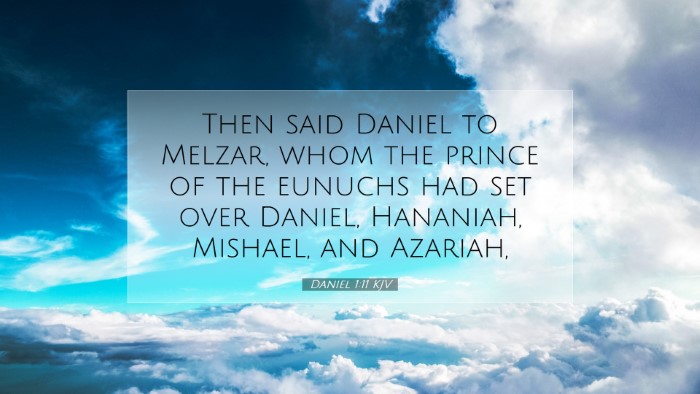Old Testament
Genesis Exodus Leviticus Numbers Deuteronomy Joshua Judges Ruth 1 Samuel 2 Samuel 1 Kings 2 Kings 1 Chronicles 2 Chronicles Ezra Nehemiah Esther Job Psalms Proverbs Ecclesiastes Song of Solomon Isaiah Jeremiah Lamentations Ezekiel Daniel Hosea Joel Amos Obadiah Jonah Micah Nahum Habakkuk Zephaniah Haggai Zechariah MalachiDaniel 1:11
Daniel 1:11 KJV
Then said Daniel to Melzar, whom the prince of the eunuchs had set over Daniel, Hananiah, Mishael, and Azariah,
Daniel 1:11 Bible Commentary
Commentary on Daniel 1:11
Daniel 1:11 states: "Then Daniel said to the steward whom the chief of the eunuchs had appointed over Daniel, Hananiah, Mishael, and Azariah," This verse reveals a pivotal interaction between Daniel and the royal steward. Below, we delve into various insights from esteemed public domain commentaries that provide depth to our understanding of this passage.
Contextual Background
The book of Daniel is set during the Babylonian exile—a period when many young Israelites were taken captive and forced to serve in the king's court. Daniel, along with his friends, is confronted with the challenge of maintaining their faith and dietary restrictions dictated by the Law of Moses while navigating their new environment.
Insights from Various Commentators
Matthew Henry's Commentary
Matthew Henry emphasizes the faithfulness of Daniel and his companions amidst pressure to conform to the Babylonian customs. He notes that Daniel's request to the steward was not merely a personal preference but a matter of obedience to God's law.
- Faithfulness: Daniel exemplifies unwavering faith in a foreign land, recognizing the spiritual implications of dietary choices.
- Courage and Respect: Daniel approaches the steward with respect, suggesting a diplomatic method to advocate for his beliefs.
Albert Barnes' Commentary
Albert Barnes provides a thorough analysis of the Hebrew terms used in this verse. He suggests that Daniel was aware of the dietary laws and purposefully sought a mode of compliance. Barnes draws attention to the importance of conjecture versus reality, noting the perilous position Daniel was in.
- Divine Providence: Barnes highlights the belief that God was directing Daniel’s steps, ensuring favor with the chief eunuch despite the restrictions he faced.
- Wisdom in Approach: The approach Daniel took serves as an example of wisdom for believers: to maintain principles without unnecessarily provoking authority.
Adam Clarke's Commentary
Adam Clarke focuses on the implications of dietary choices in the Hebrew culture. He elucidates that the food offered by the king would have likely been unclean per Jewish law. Clarke interprets Daniel's choice as one of purity and dedication to God’s law.
- Moral Integrity: Clarke highlights that Daniel's request was grounded in a desire to remain morally upright, making the case for consistent adherence to God’s commandments.
- Example for Believers: Clarke's insights suggest that believers today should likewise stand firm in their faith in the face of societal pressures.
Theological Implications
The manner in which Daniel interacts with the steward reflects important theological themes:
- The Sovereignty of God: The events in this chapter illustrate God's control over earthly affairs, using even foreign kings to fulfill His purposes.
- Faithful Witness: Daniel's firm stance serves as a model for how Christians can maintain their beliefs in secular environments.
- The Importance of Community: The mention of Hananiah, Mishael, and Azariah shows that standing firm in faith is often a communal endeavor.
Practical Applications
For pastors, students, and theologians, Daniel 1:11 offers profound lessons that can be applied in various contexts:
- Encouragement for Standing Firm: This passage encourages believers to remain steadfast in their faith, particularly in challenging environments.
- Diplomacy in Faith: Daniel's approach teaches that one can advocate for their beliefs respectfully and wisely, a principle applicable in contemporary discourse.
- Leadership in Faith Communities: The example set by Daniel in leadership can inspire contemporary leaders to cultivate environments where faith is prioritized even under pressure.
Conclusion
In closing, Daniel 1:11 serves not only as a narrative of individual faithfulness but also as a foundation for understanding the broader themes of divine sovereignty, community in faith, and moral integrity. The commentaries from Henry, Barnes, and Clarke enrich our comprehension and application of this significant verse, urging us to reflect critically on how we engage with our faith in diverse settings.


